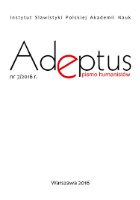
Adeptus
Scope & Guideline
Connecting Scholars, Cultures, and Ideas in Slavic Research
Introduction
Aims and Scopes
- Cultural Narratives and Identity:
The journal frequently examines how cultural narratives shape and reflect identities, particularly in post-socialist societies, exploring themes related to memory, representation, and myth-making. - Spatial Analysis in Literature and Society:
Adeptus emphasizes the importance of space in both literature and real-life contexts, analyzing how specific locations influence social interactions, cultural expressions, and historical narratives. - Minority Languages and Identities:
The journal addresses issues surrounding minority languages and their role in identity formation, focusing on language practices, revitalization efforts, and the sociolinguistic dynamics in multilingual settings. - Interdisciplinary Approaches to Humanities:
Adeptus encourages interdisciplinary research that bridges literature, sociology, linguistics, and history, fostering a comprehensive understanding of cultural phenomena. - Contemporary Social Movements and Activism:
The journal explores contemporary social movements and their cultural implications, highlighting activism within various socio-political contexts.
Trending and Emerging
- Cultural Memory and Representation:
There is an increasing emphasis on how cultural memory shapes identities and collective experiences, particularly in the context of post-socialist societies, reflecting a growing interest in the politics of memory. - Activism and Social Change:
Recent publications have highlighted the role of activism in shaping cultural and social landscapes, indicating a trend towards exploring grassroots movements and their impact on contemporary society. - Transculturalism and Pluricentric Perspectives:
The journal is increasingly focusing on transculturalism and pluricentric perspectives, which consider the interplay of multiple cultures and identities, particularly in multilingual societies. - Autobiographical and Biographical Studies:
There is a notable trend towards autobiographical and biographical studies that analyze individual experiences within broader socio-cultural contexts, facilitating a personal understanding of collective narratives. - Ecological and Environmental Narratives:
Emerging themes related to ecological narratives and environmental activism are becoming more prominent, reflecting a societal shift towards addressing environmental issues through cultural lenses.
Declining or Waning
- Historical Linguistics:
The focus on historical linguistics, particularly the study of ancient texts and their socio-cultural contexts, has decreased, indicating a shift towards contemporary issues and modern language practices. - Traditional Literary Analysis:
There seems to be a waning interest in traditional literary analysis that does not incorporate socio-political dimensions, as more recent papers emphasize the intersections of literature with current social issues. - Static Cultural Representations:
Papers that merely document cultural representations without engaging with their dynamic and evolving nature are appearing less frequently, suggesting a move towards more critical and analytical approaches. - Regional Studies with Limited Scope:
Research that focuses narrowly on specific regional studies without broader implications or connections to wider social themes has seen a decline, indicating a preference for more global or comparative perspectives.
Similar Journals

Slovo
Illuminating the Intersection of Literature and HistorySlovo, published by the University College London, School of Slavonic & East European Studies, is a vital scholarly journal dedicated to the exploration of Slavic languages and cultures, as well as the broader social sciences and humanities. Established with a commitment to advancing academic discourse, Slovo serves as a platform for researchers, professionals, and students interested in the dynamic intersections of literature, history, and cultural studies within Slavic and Eastern European contexts. Although it holds a Q4 ranking in both the Arts and Humanities and Social Sciences categories, the journal’s emphasis on fresh perspectives often invites innovative contributions that challenge conventional narratives. While lacking an Open Access option, Slovo remains integral for those seeking to navigate its multifaceted terrain, ensuring that emerging scholars and established academics alike can engage with rigorous research from 2012 to 2023 and beyond. With its headquarters in London, United Kingdom, this journal not only reflects the rich heritage of its academic lineage but also fosters a vibrant community committed to the exploration of Slavic and East European studies.
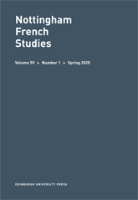
NOTTINGHAM FRENCH STUDIES
Fostering Interdisciplinary Dialogue in French StudiesNOTTINGHAM FRENCH STUDIES is a distinguished academic journal published by Edinburgh University Press, focusing on the diverse realms of French language, literature, culture, and history. With its ISSN 0029-4586 and E-ISSN 2047-7236, the journal serves as a vital platform for scholarly discourse, featuring interdisciplinary research that bridges gaps between Cultural Studies, Linguistics, and Literary Theory. Notable for its robust performance, it holds a Q3 ranking in Cultural Studies and Linguistics and a Q2 ranking in Literature and Literary Theory as of 2023, placing it among the key publications within its field. Throughout its publication span from 1996 to 2024, NOTTINGHAM FRENCH STUDIES has consistently catered to the academic community with insightful articles, enriching the understanding of French cultural contexts. While it is not an Open Access journal, its contributions are pivotal in advancing scholarly dialogue and fostering critical perspectives, making it an essential resource for researchers, professionals, and students engaged in French studies and its interdisciplinary connections.
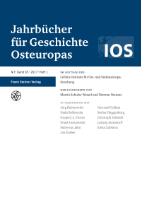
JAHRBUCHER FUR GESCHICHTE OSTEUROPAS
Enriching Understanding of Eastern Europe's Cultural ChroniclesJAHRBUCHER FUR GESCHICHTE OSTEUROPAS, published by FRANZ STEINER VERLAG GMBH, is a prominent academic journal dedicated to the exploration of Eastern European history. With its inception dating back to 1978, this journal has consistently provided a platform for scholarly discourse, contributing significantly to the understanding of the region's complex historical narratives. While the journal is not open access, it holds a solid reputation within the academic community, positioned in the Q4 quartile in history as per the 2023 category rankings, and stands at Rank #1636 within the Scopus Arts and Humanities History ranking. The convergence of its publication years throughout the decades emphasizes a long-standing commitment to historical research, thereby making it an essential resource for researchers, professionals, and students interested in Eastern European studies. Explore the intricate dynamics of historical events and cultural developments that shape Eastern Europe through this invaluable periodical.

Studi Slavistici
Championing Diverse Voices in Slavic ScholarshipStudi Slavistici is an esteemed academic journal published by FIRENZE UNIV PRESS, focusing on the rich and diverse fields of Cultural Studies, Linguistics and Language, and Literature and Literary Theory. Since its initiation in 2004, it operates under an Open Access model, providing unrestricted access to its contents and fostering a wider dissemination of research. Based in Italy, this journal serves as a vital platform for scholars and researchers engaged in Slavic studies and beyond, encouraging interdisciplinary dialogue and innovative approaches. With its current Quartile rankings in the Q4 category across various domains, it plays a significant role in shaping dialogues within the academic community while offering insights into contemporary and historical perspectives. By maintaining an inclusive vision and engaging with critical issues, Studi Slavistici remains dedicated to advancing knowledge and scholarship in these intricate fields.

Slavia-Casopis pro Slovanskou Filologii
Cultivating Knowledge in the Heart of Slavic PhilologySlavia-Casopis pro Slovanskou Filologii is an esteemed journal dedicated to the advancement of Slavic philology, published by the SLOVANSKY USTAV AKAD CESKE REPUBLIKY in the heart of the Czech Republic. With its ISSN: 0037-6736, the journal serves as a vital platform for scholarly exchange, embracing a rich academic tradition since its convergence years beginning in 2002. The journal has achieved notable recognition, with a Q3 ranking in Linguistics and Language and a Q2 in Literature and Literary Theory as of 2023, highlighting its contribution to these dynamic fields. Although it does not currently offer open access, its rigorous selection of articles ensures that it remains a crucial resource for researchers and practitioners alike, facilitating a deeper understanding of Slavic languages and literature. Scholars benefit from the journal's extensive research backdrop, enhanced by its current ranks in the Scopus database, underscoring its significant placement within the academic literature landscape. The editorial scope of Slavia promotes innovative inquiries that reflect cultural, historical, and theoretical perspectives endemic to Slavic studies, making it indispensable for professionals, students, and enthusiasts invested in the exploration of Slavic linguistic and literary heritage.

WELT DER SLAVEN-HALBJAHRESSCHRIFT FUR SLAVISTIK
Bridging Cultures Through Slavic LiteratureWelt der Slaven-Halbjahresschrift fur Slavistik is a distinguished academic journal dedicated to the field of Slavic studies, published by Harrassowitz Verlag. With a focus on the rich tapestry of Slavic languages, literature, and cultural theory, this journal provides a vital platform for scholars, researchers, and students interested in the complexities of Slavic linguistics and literary expression. It operates on a semi-annual basis, encompassing converged years from 2002 to 2015 and continuing from 2017 to 2024, ensuring a continuous dialogue in an evolving academic landscape. Despite its Q4 and Q3 rankings in various categories—such as Linguistics and Language, Literature and Literary Theory, and Visual Arts and Performing Arts—its impact is noteworthy, with Scopus ranks that place it within the upper percentiles of arts and humanities fields. While currently not an open access publication, it remains an essential resource for those engaged in the interdisciplinary exploration of Slavic cultures and their global significance. The journal emphasizes innovative research and critical analysis, making it a key contribution to the ongoing discourse in Slavistics.

ZEITSCHRIFT FUR SLAVISCHE PHILOLOGIE
Advancing Understanding in Slavonic PhilologyZEITSCHRIFT FUR SLAVISCHE PHILOLOGIE is a pivotal journal in the field of Slavonic philology, published by Universitatsverlag C Winter Heidelberg GmbH. Renowned for its scholarly rigor and insightful contributions, this journal serves as a key platform for researchers, professionals, and students interested in Slavic languages and linguistics. Despite its classification as a traditional subscription journal, it has maintained a consistent presence in the academic community with contributions that enhance understanding of linguistic, cultural, and literary studies within the Slavic context. With an H-index reflecting its impact and relevance, the journal has historically been indexed in Scopus, ranking in the 34th and 33rd percentiles within the Arts and Humanities and Social Sciences categories, respectively. The journal has featured a range of scholarly articles from 2002 to 2017, providing a rich repository of knowledge for those dedicated to the study of Slavic languages. For any researcher aiming to delve into this dynamic field, ZEITSCHRIFT FUR SLAVISCHE PHILOLOGIE remains an essential resource.
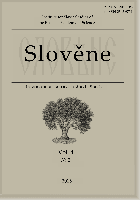
Slovene-International Journal of Slavic Studies
Connecting Cultures Through Scholarly ExchangeThe Slovene-International Journal of Slavic Studies, published by the Russian Academy of Sciences, Institute of Slavic Studies, serves as a vital platform for scholarly discourse in the fields of Cultural Studies, History, Linguistics, and Religious Studies. Since its transition to Open Access in 2012, the journal has enriched academic dialogue, enabling wider circulation and accessibility of research findings. Based in the Russian Federation, the journal supports interdisciplinary approaches, inviting contributions that push the boundaries of traditional Slavic studies. With a commendable ranking in the Q3 quartile across multiple categories as of 2023 and respectable Scopus rankings, it stands out as a crucial resource for researchers and students alike, enhancing their understanding of Slavic and related cultural contexts. The journal's commitment to fostering international collaboration and dialogue positions it as an invaluable asset for anyone engaged in the complexities of Slavic studies.

Studia z Filologii Polskiej i Slowianskiej
Advancing Knowledge in Slavic Language StudiesStudia z Filologii Polskiej i Slowianskiej is a prominent journal published by the Polish Academy of Sciences, Institute of Slavic Studies, focusing on the rich and diverse field of linguistics and language studies, particularly within the Slavic context. With the ISSN 0081-7090 and E-ISSN 2392-2435, this open-access journal has been a valuable resource for researchers, professionals, and students since its transition to an open-access model in 2014. It features rigorous peer-reviewed articles that contribute to the understanding of linguistic phenomena and cultural narratives across Slavic languages. Recognized within the Q3 quartile of linguistics and language in 2023, it ranks at the intersection of arts, humanities, and social sciences, providing insights that echo through disciplines such as sociolinguistics, psycholinguistics, and philology. In its ongoing publication trajectory from 2011 to 2023, Studia z Filologii Polskiej i Slowianskiej continues to foster academic discourse and collaboration, positioning itself as a key player in the global linguistic community.
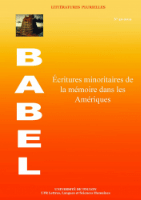
Babel-Litteratures Plurielles
Exploring the Tapestry of Global LiteratureBabel-Litteratures Plurielles is a prominent peer-reviewed journal published by UNIV SUD TOULON-VAR, specializing in the field of comparative literature and multilingual studies. With an ISSN of 1277-7897 and an E-ISSN of 2263-4746, this Open Access journal has been dedicated to fostering interdisciplinary dialogue since its establishment in 1996. Its mission is to explore diverse literary expressions while examining their cultural implications, making it a vital resource for researchers, professionals, and students who are keen on understanding the dynamics of global literature. The journal’s commitment to accessibility ensures that cutting-edge research is available to a wide audience, promoting scholarly exchange and collaboration within the literary community. Located in La Garde, France, Babel-Litteratures Plurielles continues to contribute significantly to the evolving discourse in literature.